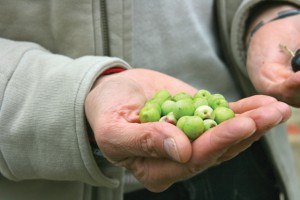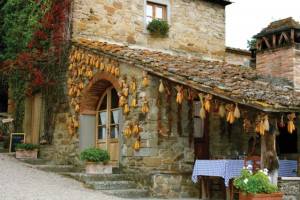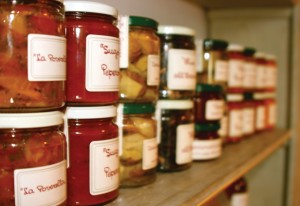As she heads to Tuscany to learn about the traditional olive harvest, Rachel Beckwith uncovers the simple pleasures of rural Italian life and, once she gets a taste for it, is fully converted…
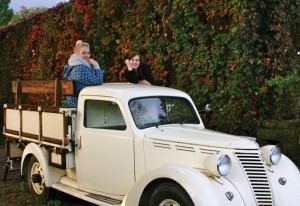 I arrived at La Vialla in October, the Tuscan sun a little shy behind the clouds, ready and willing to help with the traditional olive harvest. I was staying in one of their farmhouses at the agriturismo – without internet or television, I’d been told it was the height of rusticity. Just what I needed. The drive upwards into the hills – along weaving, bumpy roads – took me 20 minutes away from the nearest shop. I couldn’t wait to be alone in the stillness of nature again. True to expectation, as I stepped out of the car, the prevailing silence across the mountainside was incredible.
I arrived at La Vialla in October, the Tuscan sun a little shy behind the clouds, ready and willing to help with the traditional olive harvest. I was staying in one of their farmhouses at the agriturismo – without internet or television, I’d been told it was the height of rusticity. Just what I needed. The drive upwards into the hills – along weaving, bumpy roads – took me 20 minutes away from the nearest shop. I couldn’t wait to be alone in the stillness of nature again. True to expectation, as I stepped out of the car, the prevailing silence across the mountainside was incredible.
LENDING A HAND
Bright and early the next morning, after a hearty breakfast of yellow scrambled eggs and fresh bread, I went out to the groves to lend a hand. I wasn’t sure what to expect – perhaps row upon row of workers with machines, as the estate covers over a thousand hectares in total and much of that is working farmland. Instead, I meandered up the hillside and was met by just two workers who were sedately – but expertly – pulling olives from the branches by hand. Beneath them, the fruits rolled neatly into a net assembled around the base of the tree. When every branch had been stripped, these were scooped up and poured into colourful crates.
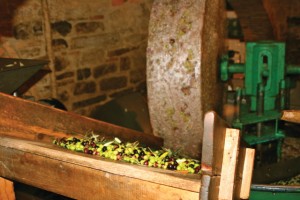 I was soon handed a small plastic rake to match theirs, and shown how to pull the branches down and comb through the leaves, releasing the ripe olives onto the ground below. The others, both seasoned workers, were using a ladder – as a beginner, I was given only the lower branches. Once into a rhythm, I realised how satisfying the whole process can be, especially surrounded by the peaceful calm of the countryside. It gave me the same, simple pleasure as running a brush over a placid horse.
I was soon handed a small plastic rake to match theirs, and shown how to pull the branches down and comb through the leaves, releasing the ripe olives onto the ground below. The others, both seasoned workers, were using a ladder – as a beginner, I was given only the lower branches. Once into a rhythm, I realised how satisfying the whole process can be, especially surrounded by the peaceful calm of the countryside. It gave me the same, simple pleasure as running a brush over a placid horse.
As we worked, I was told how the entire La Vialla estate uses biodynamic methods for its farming – a process similar to organic farming but with a much closer reliance on natural cycles. I noticed odd plastic cups hanging from the tree trunks; these turned out to be home-made insect traps that kept flies and fungus away from the olives. The estate also harvests food according to the lunar calendar – which might sound a little pagan at first, but, as one worker put it: “Think of how the moon affects the ocean tides. It stands to reason that the olive trees should be affected, too.”
At midday we drove the crates to the pressing rooms at La Lignana, the old farmhouse where the three Lo Franco brothers – Gianni, Antonio and Bandino – spent their childhood. Stepping into the kitchen, we are greeted by a crackling fire and the comforting smell of wood burning. On every wall I can see frames with pictures of the whole extended family gathered in the front garden, all smiling in the height of an Italian summer.
Venture next door and you’ll find the huge stone mill, gyrating over the olives to form the beginning of La Vialla’s purest oil. The air is heavily perfumed with a rich, grassy smell. I am given a tour (my guide helpfully shouting over the buzz of machines) and shown how the messy pulp at the beginning can become a clear elixir at the end. And, as a special treat, I am allowed to taste the oil straight from the press. It’s quite unlike any oil I’ve ever tasted before: bright green, for starters, with a distinct peppery flavour – from the leaves, I’m told, which are left in the process here.
Visitors to La Vialla can help with the olive harvest – or indeed the wine vendemmia in summer months – as much or as little as they wish. I decided to take an afternoon walk around the grounds, where I encountered the beautiful alberi in amore – or the ‘trees in love’. These are two skyscraping cypress trees that have grown into each other, entangling their roots and finally joining at the top and growing parallel. This, among so many other idyllic scenes, is what makes the estate such a perfect retreat for artists throughout the year.
The best thing about staying here is that there is plenty to do, and yet so little that must be done. Many guests at La Vialla come from Germany, keen to go hiking. Some even go swimming in the lake (although I’m quickly advised against this, especially given the time of year). You can find other, healthy distractions if you must – or just indulge in the fantastic food, all of which is grown, farmed and packaged within the estate.
There is a small museum, too, so the next day I am given a tour there by Gabriella – a wonderfully eccentric woman. With unrivalled enthusiasm, she bundles a group of us towards the entrance, fussing at the doorway to let us in. “I have more keys than Saint Peter!” she exclaims with a grin. Once inside, she walks us around the farmhouse telling the story of every object and photograph. At the end, we taste the local vin santo with cantucci, and she tells us how they make this rare treat, aged in oak barrels. So many of the staff here are bubbling with excitement and knowledge – something which is immediately contagious.
Later, I was invited to lunch with Antonio and his family. In true Italian style, the entourage that turned up was of epic proportions: aunts, uncles, wives, children – all generations came to join us around a long wooden table. There was an atmosphere of excited chatter, and understandably so. Pride of place at the centre was the olio novo – the new oil fresh from the harvest. Antonio tells me that the first tasting of the new oil is a very special occasion. He makes a toast, and then everyone passes around the oil, pouring it generously over bruschetta before plunging it into their mouths for the final verdict.
It’s a success! The ensuing feast lasts over four hours – starting with Pecorino cheese and prosciutto and then a perfect carbonara made simply with Parmesan, eggs and oil. For the secondi, we indulge in roast chicken, which my host tells me is a variety that was once close to extinction. “There are only 800 of these delicious birds in existence,” he says. Then, looking down at his empty plate, “Well…799!”
As I sat at the table, I realised that time spent at La Vialla is one of recharging batteries. If you’re a city-dweller, like me, there can be nothing better than diving headfirst into nature from time to time, and remembering the important things. The prevailing silence that I found when I first arrived was, however, long gone – replaced instead by the unmistakable rhythms of Italian speech, and the excitement found in a new bottle of olive oil.
Fattoria La Vialla
Via di Meliciano 26, 52029
Castiglion Fibocchi, Tuscany
+39 0575 430020
For more information about Fattoria La Vialla and to request a free brochure for their products, visit www.flavialla.it.

